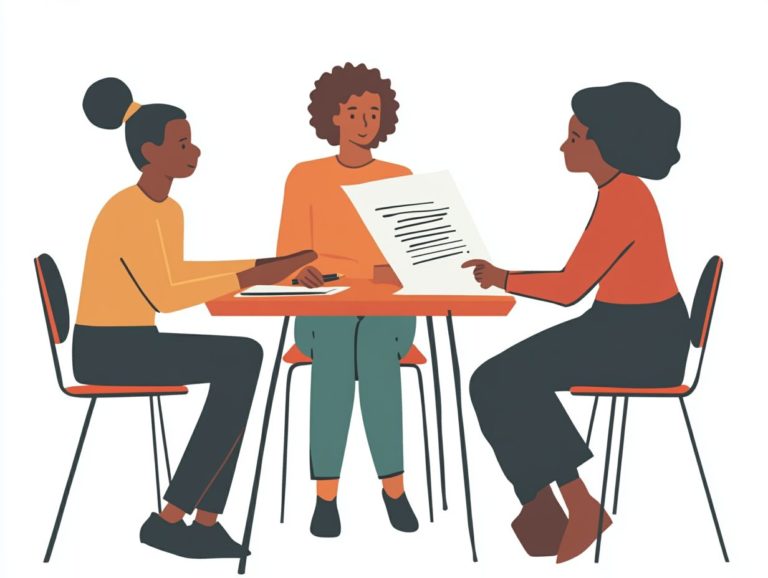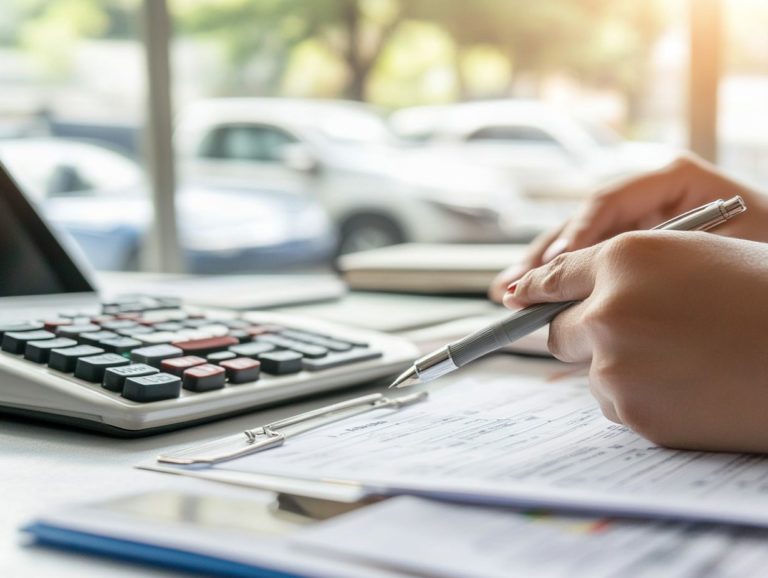The Best Time of Year to Negotiate Car Prices
Negotiating the best price for a car can have a substantial impact on your budget. Understanding the timing involved is essential to this process.
Certain times of the year present more favorable opportunities for savings, thanks to seasonal sales, promotional events, and the transition between model years.
Being aware of personal timing factors and current market conditions can significantly boost your negotiating power.
This guide will explore the optimal moments for negotiation, effective strategies to secure an excellent deal, and crucial tips to prepare you for successful negotiations.
Contents
- Key Takeaways:
- Why Timing is Your Best Friend in Car Negotiations
- Best Times of Year to Negotiate Car Prices
- Other Factors to Consider
- Tips for Negotiating Car Prices
- Frequently Asked Questions
- What s the Best Time of Year to Negotiate Car Prices?
- Why is the End of the Year the Best Time to Negotiate Car Prices?
- Are There Any Other Times Besides the End of the Year to Negotiate Car Prices?
- Should I Wait Until the End of the Month to Negotiate Car Prices?
- Do Car Prices Vary Depending on the Season?
- How Can I Prepare to Negotiate Car Prices at the Best Time of Year?
Key Takeaways:

Timing is crucial in car negotiations and can greatly affect the final price.
The best times of year to negotiate car prices are during seasonal sales and promotions, as well as at the end of the model year.
Aside from timing, personal factors and market conditions should also be taken into consideration when negotiating car prices.
Why Timing is Your Best Friend in Car Negotiations
Timing is everything when it comes to car negotiations. It can significantly influence not only the deals you secure but also the entire experience of purchasing your vehicle.
Throughout the year, distinct cycles create unique opportunities for you as a buyer. It is essential to know the optimal times to make your move.
Key periods like Memorial Day and Labor Day can lead to substantial savings. The months from October to December often offer advantageous conditions, as dealerships scramble to meet end-of-year quotas and clear out excess inventory.
By seizing these moments, you can enjoy an improved selection, better prices, and a deal that feels truly competitive.
Best Times of Year to Negotiate Car Prices
Identifying the optimal times of year to negotiate car prices can lead to substantial savings and an enhanced purchasing experience. For detailed insights, consider checking out the best times to buy used cars, as October and December traditionally emerge as prime months in the automotive calendar.
During this time, dealerships frequently offer enticing end-of-year deals to meet their sales targets, along with generous incentives for new cars. This time is also great for trading in used vehicles, often resulting in a superior selection and competitive offers.
Seasonal Sales and Promotions
Seasonal sales and promotions are crucial moments in your car-buying journey. They present exceptional opportunities to snag competitive deals on new vehicles.
Holidays like Memorial Day and Labor Day are particularly noteworthy. Dealerships unveil significant promotions aimed at attracting buyers, which can translate into substantial savings on a variety of cars.
These events often showcase limited-time offers, including enticing cash rebates, lower financing rates, and enhanced trade-in values, making them especially enticing for savvy shoppers.
Major holidays like Black Friday and New Year’s Eve inject a sense of urgency, encouraging you to act swiftly to seize the best deals.
During these peak periods, car dealerships typically highlight special offers, allowing you to benefit from unique incentives. With high inventory turnover and increased consumer interest, shopping during these times not only opens the door to better prices but also offers a wider selection of vehicles, enriching your overall car-buying experience.
End-of-Model-Year Deals

End-of-model-year deals are your golden ticket to savings! During this time, manufacturers and dealerships want to sell older cars to welcome the new models.
You ll often find substantial factory-to-dealer incentives in play, which can lower average vehicle costs, leading to more favorable prices for those ready to invest in a new car.
These enticing deals typically emerge in the last quarter of the calendar year, making it a prime time for savvy shoppers like yourself. Industry reports suggest that discounts can range from 10% to 15% off the Manufacturer’s Suggested Retail Price (MSRP), depending on the make and model, significantly enhancing your affordability.
Factory-to-dealer incentives serve as a powerful motivator for sales teams to move inventory, ultimately translating to lower prices for you. As dealerships strive to meet their sales targets before the year wraps up, these incentives foster a competitive marketplace, ensuring you can discover incredible deals on high-quality vehicles while dealerships efficiently manage their inventory.
Other Factors to Consider
Timing is important in car negotiations, but other elements also shape your purchasing experience. Personal circumstances and market dynamics play significant roles.
Your financial readiness and credit score dictate the best time for you to buy a car. Meanwhile, market conditions, like auto loan rates and interest adjustments, impact your overall costs.
Personal Timing Factors
When to buy a car hinges on personal timing factors. Your financial readiness and credit score affect your options and potential savings.
Understanding your financial situation helps you find the best time to negotiate for a great deal.
Your credit score is crucial; it influences loan approval and interest rates, affecting your investment. A higher score often means lower rates, leading to significant savings.
Consider your stable income, existing debts, and future expenses. These factors shape your purchasing power during negotiations.
By knowing your financial landscape, you can make informed decisions that enhance your car-buying experience.
Market Conditions
Market conditions significantly impact the auto industry. They affect dealership offers and your purchasing power.
Auto loan rates and interest cuts create a buyer-friendly environment. Conversely, challenges like microchip shortages can limit inventory and prices.
Economic indicators can sway your confidence and willingness to invest in vehicles. They might push you to buy soon or wait for stability.
Rising fuel prices may lead you to consider fuel-efficient models. Attractive incentives from automakers might spark interest in electric vehicles.
Understanding these elements gives you insights into consumer trends and market dynamics, helping you make informed choices.
Tips for Negotiating Car Prices

Negotiating car prices requires preparation and strategy. This approach helps you secure the best deal.
Start by getting pre-approved for an auto loan. This simplifies your buying process and strengthens your position when discussing terms with dealers.
Compare prices to gain insights into fair market value. This knowledge helps you negotiate confidently.
Preparing for Negotiations
Getting ready for negotiations boosts your chances of saving money! Research vehicles thoroughly and understand market values.
This preparation empowers you during negotiations. Equip yourself with facts to shift dynamics in your favor.
Use online resources to identify fair pricing for specific makes and models. Understanding historical trade-in values can offer a valuable bargaining chip.
As an informed buyer, stay flexible and assertive during negotiations. Be ready to walk away if terms don t meet your expectations.
Your thorough preparation transforms negotiations into a manageable and rewarding experience.
Effective Negotiation Techniques
Employing effective negotiation techniques can significantly boost your chances of securing a favorable deal when purchasing a vehicle.
Consider timing your visit to the dealership. Choose slower days, particularly during late morning or early afternoon, to minimize high-pressure sales tactics.
This creates a more conducive environment for negotiations. Researching peak sales periods like the end of the month or fiscal quarters can enhance your negotiating position. Salespeople are often more motivated to close deals during these times.
Researching the vehicle’s market value is crucial. Establish a budget beforehand, giving you the power to make confident counteroffers.
Building rapport with the salesperson can lead to more favorable terms. Engage them with thoughtful questions about the vehicle to help set a positive tone.
Remember, walking away can be your strongest strategy! It shows dealers you mean business and may encourage them to make concessions.
Negotiating with Dealerships
Negotiating with dealerships demands a solid grasp of their offers and incentives to maximize your deal. Familiarize yourself with deals offered by manufacturers to dealerships and understand the value of your trade-in to employ effective negotiation tactics.
One savvy strategy is to research manufacturer promotions. These can provide you with an edge during discussions. For instance, if you discover that the dealership is offering a cash-back incentive, highlighting this can help you negotiate a lower vehicle price.
Being aware of the current market value of your trade-in allows you to negotiate confidently. This ensures you secure a deal that accurately reflects the true worth of your vehicle.
Keep in mind that trade-ins not only reduce the purchase price but also have the potential to influence financing terms. Tackle this aspect with a strategic mindset.
By equipping yourself with knowledge about various incentives and the impacts of trade-ins, you can transform what may feel like a daunting process into a highly advantageous negotiation experience.
Frequently Asked Questions

What s the Best Time of Year to Negotiate Car Prices?
The best time of year to negotiate car prices is typically at the end of the year, specifically during the holiday season. For more details on timing, check out what is the best time to buy a car. Dealerships often look to meet their annual sales goals and are more willing to negotiate prices during this time.
Why is the End of the Year the Best Time to Negotiate Car Prices?
The end of the year is the best time to negotiate car prices because dealerships are under pressure to meet their annual sales goals. For more insights, check out timing your purchase, as this means they may be more willing to offer discounts and incentives to make a sale.
Are There Any Other Times Besides the End of the Year to Negotiate Car Prices?
Yes, there are other advantageous times throughout the year to negotiate car prices. These include slow sales months, typically in the winter, and the end of the quarter when dealerships are trying to meet sales quotas.
Should I Wait Until the End of the Month to Negotiate Car Prices?
Waiting until the end of the month to negotiate car prices may also be beneficial. Dealerships may be more willing to make a deal to meet their monthly sales quotas.
Do Car Prices Vary Depending on the Season?
Yes, car prices can vary depending on the season. Typically, prices are higher in the spring and summer when demand is greater and lower in the fall and winter when demand is lower.
How Can I Prepare to Negotiate Car Prices at the Best Time of Year?
To prepare to negotiate car prices at the best time of year, do your research on the make and model you are interested in, set a budget, and be prepared to walk away if the price is not right. It may also be helpful to get pre-approved for financing beforehand.






